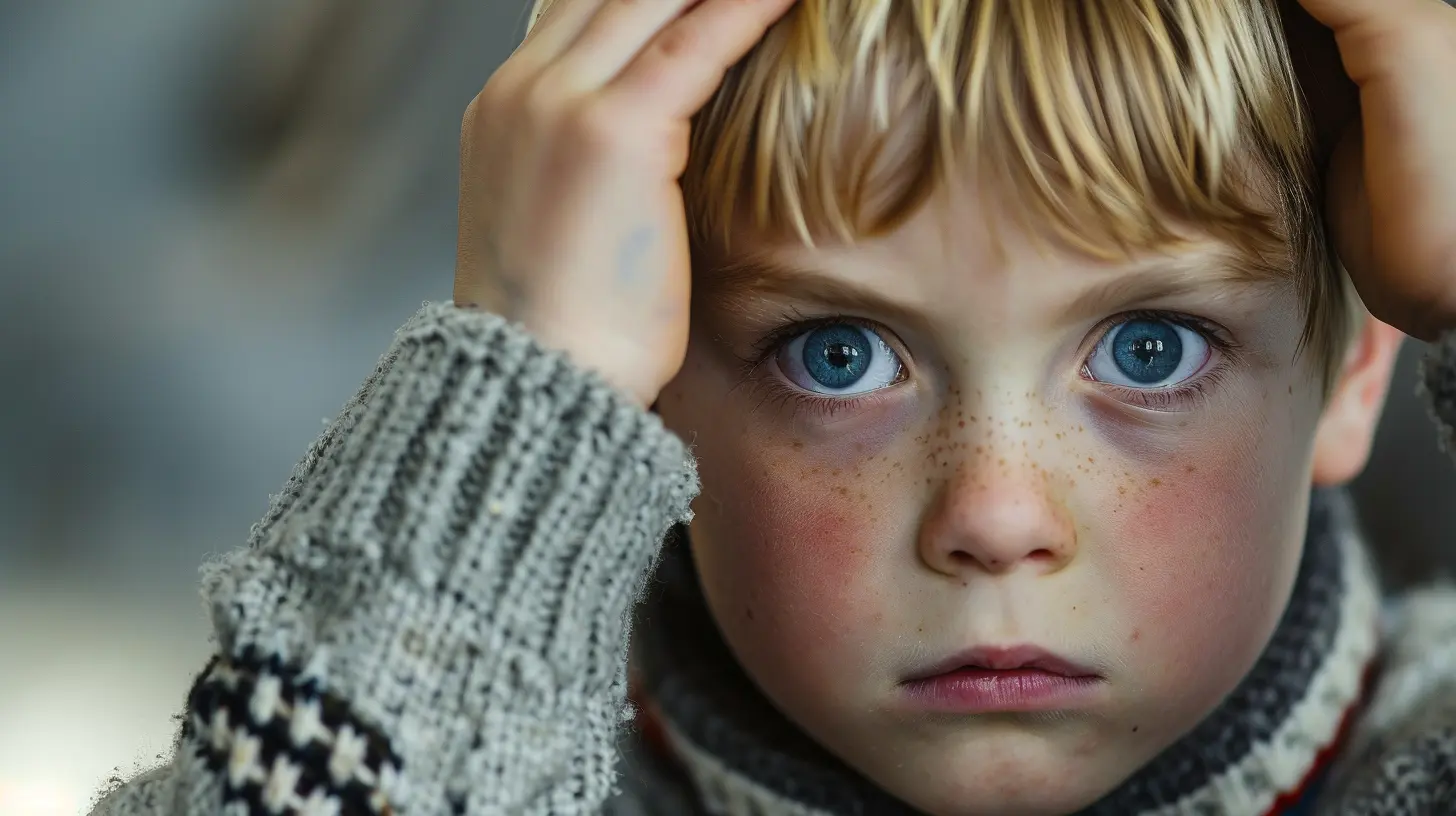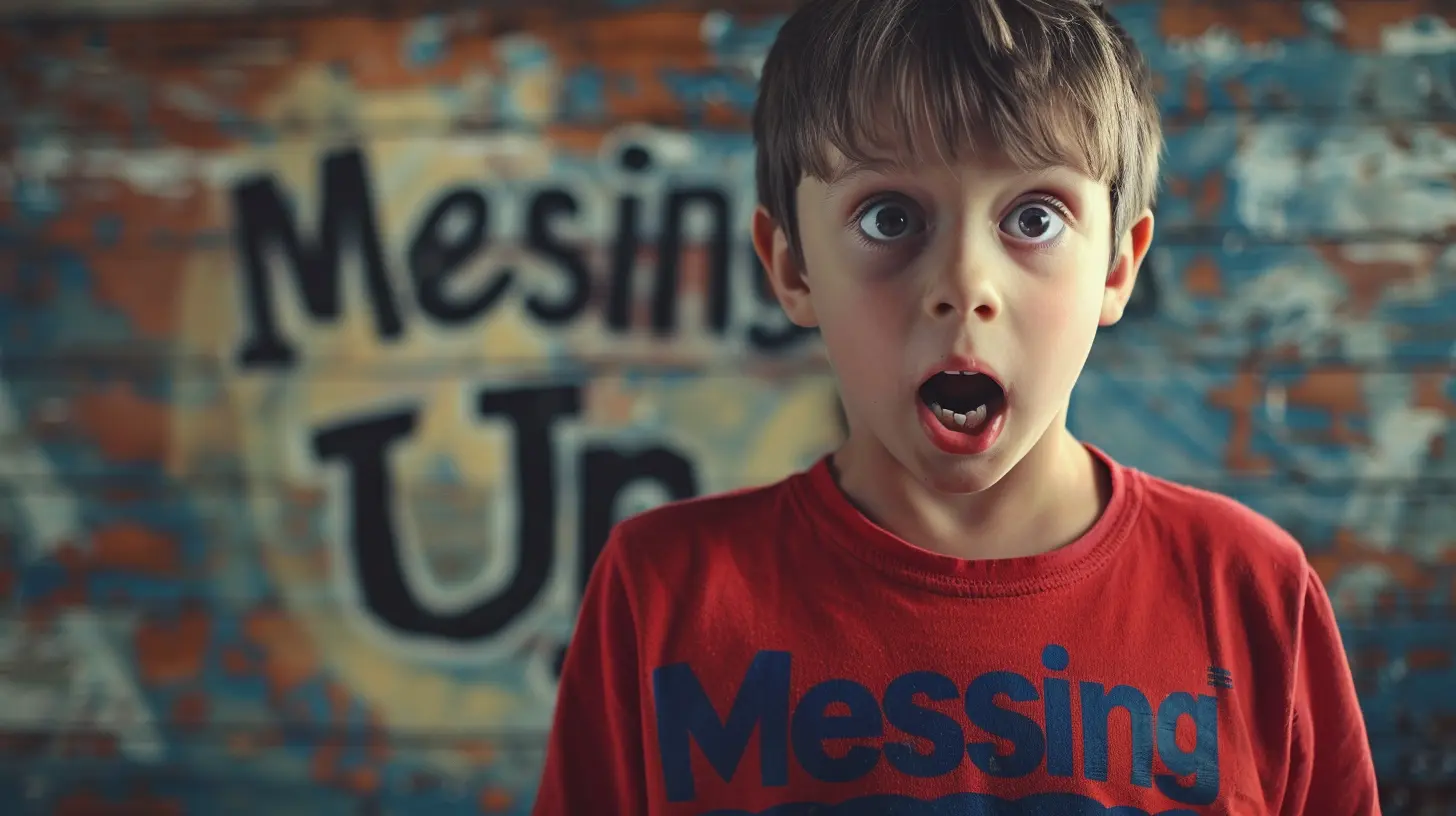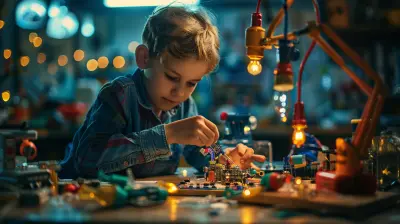How to Overcome the Fear of “Messing Up” Your Kids
21 January 2025
Parenting, am I right? It's like being handed the blueprint for a rocket ship and told, "Here, build this. Oh, and make it fly perfectly." No pressure or anything! We’ve all been there—lying awake at 2 a.m., staring at the ceiling, wondering if you said the wrong thing when your kid wouldn’t eat their broccoli. If you’re stuck in this constant mind game of "Am I totally screwing them up?"—first, deep breath. Let’s talk about how to kick that fear of "messing up" your kids right to the curb.
Because guess what? None of us are perfect. Not you, not your mom, not even that mom on Instagram with the matching outfits and the immaculate house (I bet she has a junk drawer that would make your jaw drop). The fear of ruining your kids can feel heavy, but it doesn’t have to run the show. Let’s unpack this together, one sassy, truth-filled nugget at a time.
Why Are We So Dang Worried?
First off, it’s important to get real about why this fear exists. Spoiler alert: It’s not because you actually suck at parenting.We live in a world that LOVES to overshare. Between social media feeds filled with picture-perfect families and Aunt Karen’s unsolicited parenting advice at Thanksgiving, it’s easy to feel like you’re not measuring up. Add in all the self-help books, mommy podcasts, and Pinterest boards, and suddenly, you’re spiraling. "Am I supposed to do Montessori? Are time-outs bad? Wait, is screen time going to ruin their ability to do math?!"
Here’s the thing: The fear of messing up comes from a good place. You care. You love your kids so much that you’re willing to overanalyze everything from bedtime routines to how you pack their lunch. Give yourself a pat on the back for that. But also? Let’s take it down a notch. 
The Myth of the "Perfect Parent"
Newsflash: Perfect parenting isn’t real. It’s like a unicorn riding a rainbow—cute to imagine, but it doesn’t exist.What actually messes kids up isn’t the occasional bad day or questionable parenting choice (yes, bribing them with cookies to get their shoes on will be okay). It’s consistently being absent, unkind, or neglectful. Unless you’re actively trying to recreate a Disney villain origin story in your home, chances are, your kids will turn out just fine.
Here’s a fun fact: Even psychology backs us on this. Ever heard of "good enough parenting"? Yep, it’s a thing. Basically, kids don’t need you to be a superhero, they just need you to show up, try your best, and love them with all your messy, human imperfections. So, stop chasing an impossible standard. Your kids need YOU, not some Stepford version of you. 
Let’s Talk About Mistakes (Spoiler: You’ll Make Them)
Oh, honey, you’re gonna mess up. You just are. But here’s the kicker—it’s okay. Mistakes are part of the package deal that comes with raising tiny humans.Think about it: Do you remember every little thing your parents did wrong? Probably not. Instead, you likely remember how they made you feel, right? That’s the stuff that sticks. When you snap at your kid because they’ve spent 20 minutes refusing to put their socks on, it’s not the end of the world. What matters is that you circle back and say, “Hey, I’m sorry I yelled earlier. I was feeling frustrated, but it wasn’t okay for me to react that way.” Boom. Teachable moment.
By owning your mistakes, you’re modeling accountability and showing your kids that it’s okay to be imperfect. They need to see you being human so they can learn how to be human, too. 
Comparison Is a Thief, So Stop the Scroll
Let me get real with you—stop comparing yourself to other parents. Seriously, STOP IT. It’s like comparing apples to avocados.That mom who always makes organic, gluten-free snacks? Maybe she’s compensating for the fact that she feels like a hot mess about something else. That dad who never forgets to pack sunscreen? Maybe he’s secretly googling “how to get my kids to like me” every night. You don’t know their reality, and you don’t need to.
Focus on your lane. What works for your family might not work for someone else’s. And that doesn’t mean you’re doing it wrong, it just means you’re doing it YOUR way. Trust me, no one has it all figured out. Parenting is like assembling IKEA furniture—it’s confusing, there are extra screws, and you always end up winging it.
How to Turn Down the Fear Dial
Okay, so we’ve established that the fear of messing up is normal and that perfect parenting is a myth. But how do you get out of your head and start parenting with confidence? Let’s dive in:1. Get Comfortable with "Good Enough"
Repeat after me: Not every moment has to be a Hallmark movie. Some days, surviving is the win. So what if dinner was chicken nuggets and frozen peas (again)? You fed your kids. Gold star for you!2. Focus on Connection, Not Perfection
What your kids will remember most is how you made them feel. Take time to connect—a cuddle on the couch, a goofy dance party, or even just sitting and listening to their endless Minecraft stories. Connection beats perfection every time.3. Laugh at the Chaos
Parenting is messy. Literally. (Have you ever tried to clean up glitter? It’s like it multiplies just to spite you.) Instead of fighting it, roll with it. Laugh at the spilled milk and mismatched socks. Your sanity will thank you.4. Stop Overloading Your Brain
Parenting books, blogs, forums, and apps—oh my! Sometimes, the best thing you can do is tune out the noise. Trust your gut; you’re smarter than you think.5. Celebrate the Little Wins
Did your kid say "please" without being prompted? Did you make it through an entire bedtime routine without threatening to cancel Christmas? Celebrate that! Parenting is a marathon; pace yourself.Why Fear Is Actually Your Superpower
Now here’s a plot twist: Your fear of messing up might actually make you a better parent. Yeah, you heard me right.The fact that you care enough to worry shows your investment. It means you’re paying attention, trying your best, and giving a damn. Isn’t that what good parenting is all about?
Instead of letting that fear paralyze you, let it motivate you. Use it to check in with yourself and ask, “Am I showing up for my kids in the ways that matter most?” If the answer is yes (or even "most of the time”), you’re doing just fine, my friend.
When in Doubt, Take It Day by Day
Here’s the ultimate secret to overcoming the fear of messing up your kids: You don’t have to have it all figured out today. Or tomorrow. Or even next week. Parenting is a day-by-day gig.Some days, you’ll nail it and feel like a rockstar. Other days, you’ll want to crawl under a blanket and cry into your coffee. Both days are normal. Just keep showing up, keep loving them, and keep trying. Because at the end of the day, that’s what really matters.
Final Pep Talk
Listen, parenting is messy, beautiful, frustrating, and glorious all rolled into one. You’re going to mess up, and your kids will survive it—they might not even notice half the time. What they WILL notice is the love, effort, and care you pour into them every single day.So stop beating yourself up. Cut yourself some slack. You’re not a robot, and your kids don’t need you to be. They just need you to keep loving them—and maybe occasionally let them eat cake for breakfast.
Got it? Good. Now go forth and parent like the perfectly imperfect human you are.
all images in this post were generated using AI tools
Category:
Parenting StrugglesAuthor:

Noah Sawyer
Discussion
rate this article
12 comments
Liv Peterson
Embrace mistakes; they’re opportunities for growth for both you and your kids.
March 29, 2025 at 5:49 PM

Noah Sawyer
Absolutely! Mistakes are valuable teaching moments that foster resilience and learning for both parents and children.
Zephira Wilkins
This article offers insightful strategies for parents grappling with the fear of making mistakes. Emphasizing open communication and self-compassion, it reassures readers that no parent is perfect. Embracing imperfections can foster resilience in both parents and children, leading to healthier relationships.
February 2, 2025 at 5:49 AM

Noah Sawyer
Thank you for your thoughtful comment! I'm glad you found the strategies on communication and self-compassion helpful. Embracing our imperfections truly can lead to stronger connections with our children.
Wilder Pope
Loved this article! It’s so reassuring to remember that parenting is a journey filled with learning and growth for both us and our kids. Embracing imperfection can lead to beautiful connections!
January 30, 2025 at 4:36 AM

Noah Sawyer
Thank you! I’m glad you resonated with the message about embracing imperfection—it's truly key to nurturing those connections!
Ashley McGarvey
Embrace growth, not perfection.
January 29, 2025 at 3:31 AM

Noah Sawyer
Absolutely! Focusing on growth allows us to learn from our mistakes and foster resilience in both ourselves and our children.
Kenna Sullivan
Absolutely loved this article! Parenting is a beautiful journey filled with ups and downs. Remember, it's okay to make mistakes; they’re just stepping stones to growth for both you and your kids. Embrace the chaos and enjoy the ride—your love is what truly matters! 🌟❤️
January 27, 2025 at 4:33 PM

Noah Sawyer
Thank you so much for your kind words! I completely agree—embracing the journey, with all its ups and downs, is key to both our growth and our kids'. ❤️
Yazmin Allen
Embrace the journey of parenting; it's okay to make mistakes. Learn, grow, and trust that love is the strongest foundation.
January 26, 2025 at 4:15 AM

Noah Sawyer
Absolutely! Every mistake is a learning opportunity, and love truly is the best guide in parenting.
Skye Lawson
It's natural for parents to fear making mistakes, but remember that imperfection is part of growth. Focus on fostering open communication, setting realistic expectations, and practicing self-compassion. Embracing challenges can strengthen your relationship with your children and help them develop resilience in the face of adversity.
January 25, 2025 at 4:05 PM

Noah Sawyer
Thank you for your insightful comment! Embracing imperfection and fostering open communication truly helps both parents and children grow together.
Giselle Martinez
This article offers valuable insights for parents feeling overwhelmed by the fear of making mistakes. Emphasizing open communication, flexibility, and self-compassion can empower us to embrace parenting’s imperfect nature, ultimately fostering stronger, more resilient relationships with our children.
January 24, 2025 at 5:44 PM

Noah Sawyer
Thank you for your thoughtful comment! I'm glad you found the insights helpful in navigating the challenges of parenting. Embracing imperfection is key to building strong relationships with our children.
Odessa Warner
Remember, every parent stumbles a bit! Embrace the chaos, learn from the giggles and tears, and trust that love is your best guide. You’ve got this!
January 24, 2025 at 4:51 AM

Noah Sawyer
Thank you! Embracing the chaos is key, and love truly does guide us through parenting challenges. Appreciate your encouragement!
Danica McEvoy
This article offers practical insights for parents grappling with the fear of making mistakes. Emphasizing that imperfection is part of parenting, it encourages embracing vulnerability and focusing on building strong connections with children. Remember, your love and effort matter more than perfection!
January 23, 2025 at 3:32 PM

Noah Sawyer
Thank you! I'm glad the article resonated with you. Embracing imperfection truly is key to fostering strong, loving relationships with our children.
London Gray
This article tackles such a relatable concern for parents! It's comforting to remember that imperfection is part of the journey. Embracing our mistakes can lead to valuable lessons for both us and our kids. I'm eager to explore the strategies shared here and learn together!
January 23, 2025 at 4:42 AM

Noah Sawyer
Thank you for your insightful comment! Embracing imperfection truly enriches our parenting journey. I hope you find the strategies helpful!
Starling McDonald
Amidst the chaos of parenting, a hidden truth lingers: every stumble molds our children into resilient beings. Embrace the mess, for within it lies the extraordinary journey of growth, connection, and discovery—both for you and them.
January 22, 2025 at 6:05 AM

Noah Sawyer
Absolutely, embracing the chaos is essential. Every challenge is an opportunity for growth, not just for our kids, but for us as parents too. Let’s celebrate the journey!
MORE POSTS

Should Kids Have Their Own Laptops? A Guide for Parents

When Parenting Perfectionism Holds You Back

Dealing with Discrimination: How to Advocate for Your Child’s Rights

How to Use Technology to Encourage Creativity in Kids

The Importance of Self-Care for Parents of Children with Special Needs

Growing Together: Teaching Kids Life Lessons Through Your Work

Encouraging Inventive Play: Fun and Educational Activities for Creative Kids

How to Foster Independence in Your Child Without Feeling Helpless